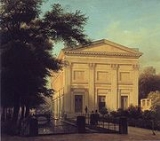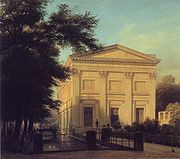
Berlin Singakademie
Encyclopedia

Berlin
Berlin is the capital city of Germany and is one of the 16 states of Germany. With a population of 3.45 million people, Berlin is Germany's largest city. It is the second most populous city proper and the seventh most populous urban area in the European Union...
in 1791 by Carl Friedrich Christian Fasch, harpsichord
Harpsichord
A harpsichord is a musical instrument played by means of a keyboard. It produces sound by plucking a string when a key is pressed.In the narrow sense, "harpsichord" designates only the large wing-shaped instruments in which the strings are perpendicular to the keyboard...
ist to the court of Prussia
Prussia
Prussia was a German kingdom and historic state originating out of the Duchy of Prussia and the Margraviate of Brandenburg. For centuries, the House of Hohenzollern ruled Prussia, successfully expanding its size by way of an unusually well-organized and effective army. Prussia shaped the history...
, on the model of the 18th century London
London
London is the capital city of :England and the :United Kingdom, the largest metropolitan area in the United Kingdom, and the largest urban zone in the European Union by most measures. Located on the River Thames, London has been a major settlement for two millennia, its history going back to its...
Academy of Ancient Music
Academy of Ancient Music
The Academy of Ancient Music is a period-instrument orchestra based in Cambridge, England. Founded by harpsichordist Christopher Hogwood in 1973, it was named after a previous organisation of the same name of the 18th century. The musicians play on either original instruments or modern copies of...
.
Early history
The origins of the Singakademie are difficult to discern because the group was initially intended as a private gathering of music lovers and only later became a public institution. The Singakademie grew out of a small circle of singers who met regularly in the garden house of the privy councillor Milow. Their weekly meetings seemed to have resembled those of the then popular Singethees. Carl Friedrich ZelterCarl Friedrich Zelter
Carl Friedrich Zelter was a German composer, conductor and teacher of music.Zelter became friendly with Johann Wolfgang von Goethe, and his works include settings of Goethe's poems...
describes them as rather informal meetings: "One gathered in the evening, drank tea, spoke, talked, in short entertained oneself; and the matter itself was only secondary." Singer and songwriter Charlotte Caroline Wilhelmine Bachmann
Charlotte Caroline Wilhelmine Bachmann
Charlotte Caroline Wilhelmine Bachmann née Stöwe was a German singer, harpsichordist and composer. She was born in Berlin, the daughter of musician Wilhelm Heinrich Stöwe, and studied singing and harpsichord as a child. At the age of nine she made her debut in the Liebhaberkonzerte...
was one of the original founding members.
Until the early nineteenth century, most musical concert and opera performances consisted of the music of living composers. The Akademie was intended by Fasch to revive music of the past as well as to perform that of the present. In fact its first performance was a 16-part Mass
Mass (music)
The Mass, a form of sacred musical composition, is a choral composition that sets the invariable portions of the Eucharistic liturgy to music...
by Fasch himself, but it also regularly performed music by J. S. Bach
Johann Sebastian Bach
Johann Sebastian Bach was a German composer, organist, harpsichordist, violist, and violinist whose sacred and secular works for choir, orchestra, and solo instruments drew together the strands of the Baroque period and brought it to its ultimate maturity...
and other earlier masters. Fasch had been a pupil of Johann Sebastian Bach's son C. P. E. Bach
Carl Philipp Emanuel Bach
right|250pxCarl Philipp Emanuel Bach was a German Classical period musician and composer, the fifth child and second son of Johann Sebastian Bach and Maria Barbara Bach...
and instilled the devotion to Bach that has been a continuing feature of the Akademie. By the time of Fasch's death on 3 August 1800 the Akademie had about 100 members, and had received many notable visitors keen to experience its unique sound, including Beethoven
Ludwig van Beethoven
Ludwig van Beethoven was a German composer and pianist. A crucial figure in the transition between the Classical and Romantic eras in Western art music, he remains one of the most famous and influential composers of all time.Born in Bonn, then the capital of the Electorate of Cologne and part of...
who came in June 1796.
After Fasch's death, his pupil Carl Friedrich Zelter
Carl Friedrich Zelter
Carl Friedrich Zelter was a German composer, conductor and teacher of music.Zelter became friendly with Johann Wolfgang von Goethe, and his works include settings of Goethe's poems...
became leader of the Akademie, continuing Fasch's ambitions and objectives. In 1807 he began an orchestra
Orchestra
An orchestra is a sizable instrumental ensemble that contains sections of string, brass, woodwind, and percussion instruments. The term orchestra derives from the Greek ορχήστρα, the name for the area in front of an ancient Greek stage reserved for the Greek chorus...
to accompany the Akademie, and in 1808 he founded a men's choir ('Liedertafel'), which became a model for similar choirs flourishing in the early nineteenth century and dedicated to German national music.
The members of the Akademie were originally drawn from the wealthy bourgeois of Berlin. From early days they also included members of some of Berlin's wealthiest Jewish families, including the Itzig family
Itzig family
Many of the thirteen children of Daniel Itzig and Miriam Wulff, and their descendants and spouses, had significant impact on both Jewish and German social and cultural history...
and descendants of Moses Mendelssohn
Moses Mendelssohn
Moses Mendelssohn was a German Jewish philosopher to whose ideas the renaissance of European Jews, Haskalah is indebted...
. These families were to have a significant influence on the history of the Akademie. Moses Mendelssohn's son, Abraham joined the Akademie in 1793 and Itzig's granddaughter, Lea Salomon, in 1796. They were later to marry and their children Felix
Felix Mendelssohn
Jakob Ludwig Felix Mendelssohn Barthóldy , use the form 'Mendelssohn' and not 'Mendelssohn Bartholdy'. The Grove Dictionary of Music and Musicians gives ' Felix Mendelssohn' as the entry, with 'Mendelssohn' used in the body text...
and Fanny
Fanny Mendelssohn
Fanny Cäcilie Mendelssohn , later Fanny Hensel, was a German pianist and composer, the sister of the composer Felix Mendelssohn and granddaughter of the philosopher Moses Mendelssohn...
were leading members of the Akademie in the 1820s.
The Akademie's Music Library
Itzig's daughter (and hence Felix's great-aunt) Sarah Levy (1761-1854), a fine keyboard player who had been taught by Wilhelm Friedemann BachWilhelm Friedemann Bach
Wilhelm Friedemann Bach , the second child and eldest son of Johann Sebastian Bach and Maria Barbara Bach, was a German composer and performer...
, played concerti by Bach and others in many Akademie concerts and at Zelter's "Ripienschule" in the period 1806-1815. Her large collection of manuscripts of music of the Bach family, together with many others acquired by Abraham Mendelssohn from the widow of C. P. E. Bach, were left to the Akademie. Zelter also had a fine collection of Bach and Bach family manuscripts which he gave to the Akademie. By these means it acquired one of the finest collections of Bachiana in the world. The collection was looted by the Red Army
Red Army
The Workers' and Peasants' Red Army started out as the Soviet Union's revolutionary communist combat groups during the Russian Civil War of 1918-1922. It grew into the national army of the Soviet Union. By the 1930s the Red Army was among the largest armies in history.The "Red Army" name refers to...
in 1945 and hidden in the Kiev
Kiev
Kiev or Kyiv is the capital and the largest city of Ukraine, located in the north central part of the country on the Dnieper River. The population as of the 2001 census was 2,611,300. However, higher numbers have been cited in the press....
Conservatory, but was returned to Germany after its rediscovery in 2000. (See link for the story). Today, the collection is temporarily housed in the music section of the Berlin State Library.
Later History
The success of the Akademie encouraged the founding of a new and permanent home. This was established in 1827 in Unter den LindenUnter den Linden
Unter den Linden is a boulevard in the Mitte district of Berlin, the capital of Germany. It is named for its linden trees that line the grassed pedestrian mall between two carriageways....
and became a major Berlin concert hall, at which many famous musicians were to give concerts, including Paganini
Niccolò Paganini
Niccolò Paganini was an Italian violinist, violist, guitarist, and composer. He was one of the most celebrated violin virtuosi of his time, and left his mark as one of the pillars of modern violin technique...
, Schumann
Robert Schumann
Robert Schumann, sometimes known as Robert Alexander Schumann, was a German composer, aesthete and influential music critic. He is regarded as one of the greatest and most representative composers of the Romantic era....
, and Brahms
Johannes Brahms
Johannes Brahms was a German composer and pianist, and one of the leading musicians of the Romantic period. Born in Hamburg, Brahms spent much of his professional life in Vienna, Austria, where he was a leader of the musical scene...
. On 11 March 1829, the 21-year old Felix Mendelssohn, who was himself a pupil of Zelter, conducted here his famous revival of Bach's St Matthew Passion, a major milestone in re-establishing its composer's reputation as a founding father of European musical traditions.
In 1832 on the death of Zelter, Mendelssohn had some hopes of succeeding him, but in the event the post went to the older, mediocre, but 'safe pair of hands' of Carl Friedrich Rungenhagen (1778- 1851). Subsequent directors of the Akademie were:
- August Eduard Grell (1851-1886)
- Martin Traugott Blumner (1827-1900)
- Georg SchumannGeorg Schumann (composer)Georg Alfred Schumann was a German composer and director of the Berlin Singakademie.-Biography:Schumann was born at Königstein, Germany, October 25, 1866. He was the son of Clemens Schumann and the older brother of Camillo Schumann...
(1900-1950) - Carl Mathieu Lange (1950-1973)
- Hans Hilsdorf (1973-1999)
- Joshard Daus (2002-2006)
- Kai-Uwe Jirka (2006- )
After the separation between East and West Berlin, the Berliner Singakademie was founded 1963 in East Berlin. This other Berliner Singakademie is a leading oratory choir in the united Berlin today.
External links
- Website of the original (1791) Sing-Akademie (in German) Some of the above information is sourced from this site.
- Website of the (1963) Berliner Singakademie (in German)

